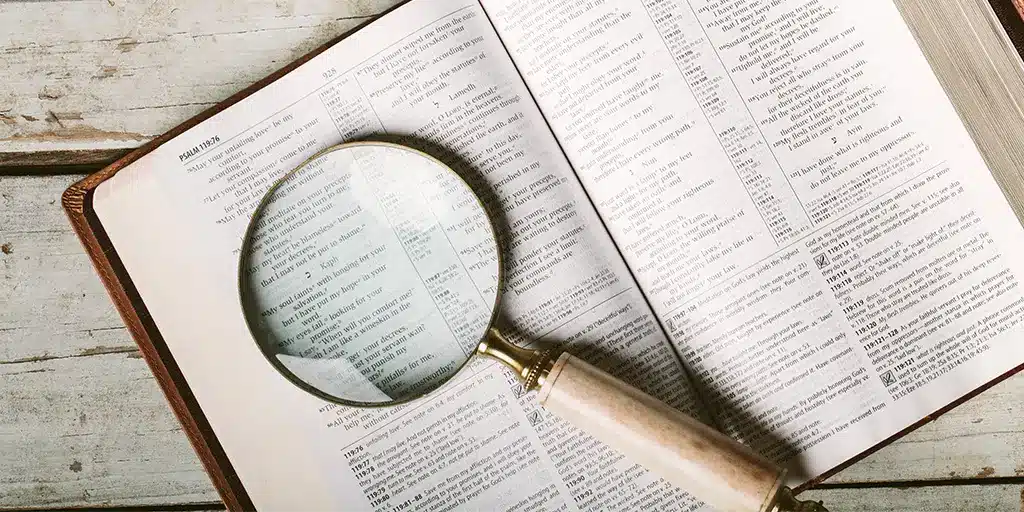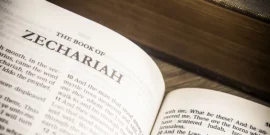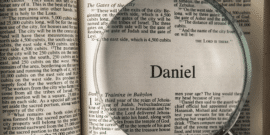Hints of the Trinity in the Old Testament (Part 4): Psalm 110

In our ongoing exploration of how the Trinity is foreshadowed in the Old Testament, we turn to our fourth and final Messianic passage for this series: Psalm 110. This psalm provides another intriguing glimpse into the divine nature of the Messiah and the distinction of persons within the Godhead, further demonstrating how the Old Testament hints at the Trinity.
Here is Psalm 110, with key verses emphasized in bold:
“The LORD says to my Lord: ‘Sit at my right hand until I make your enemies a footstool for your feet.’ The LORD will extend your mighty scepter from Zion, saying, ‘Rule in the midst of your enemies!’ Your troops will be willing on your day of battle. Arrayed in holy splendor, your young men will come to you like dew from the morning’s womb. The LORD has sworn and will not change his mind: ‘You are a priest forever, in the order of Melchizedek.’ The Lord is at your right hand; he will crush kings on the day of his wrath. He will judge the nations, heaping up the dead and crushing the rulers of the whole earth. He will drink from a brook along the way, and so he will lift his head high.” (Psalm 110:1-7)
Let’s explore how this passage depicts the Messiah sharing in God’s very essence while remaining a distinct person.
Shares in God’s Essence
Psalm 110 presents a Messianic figure with attributes that point to His divine nature:
- Superior to David: The psalm opens with “The LORD says to my Lord” (110:1). This is extraordinary because David, as Israel’s greatest king, had no human lord above him, only God. For David to refer to another figure as “my Lord” (Adoni) as he records this prophetic oracle suggests this figure holds a status beyond any earthly ruler. While not definitive proof of deity, this bewildering statement is the first indicator of the Messiah’s divine nature.
- Seated at God’s Right Hand: The LORD invites David’s Lord to “sit at my right hand” (110:1), implying a sharing of His throne. Such a position of honor and authority is never given to any creature, whether it be a human king or an angelic power.
- Universal Rule and Judgment: The psalm describes this Messianic figure at the LORD’s right-hand ruling “in the midst of your enemies” (110:2) and executing judgment among the nations (110:5-6). In the Old Testament, final and universal judgment is consistently attributed to the LORD alone. By associating these divine prerogatives with the figure at God’s right hand, the psalm further reinforces the divine status of the Messiah.
- Eternal Priest-King in the Order of Melchizedek: The declaration, “You are a priest forever, in the order of Melchizedek” (Psalm 110:4), links the Messiah to a figure of profound significance. Melchizedek, mysteriously introduced in Genesis 14 without genealogy, uniquely combined the roles of king and priest and received tithes from Abraham, the patriarch of Israel. By associating the Messiah with Melchizedek, the psalm conveys several powerful implications:
- Superiority Over Abraham: The Messiah is portrayed as superior even to Abraham, from whom Israel and the Levitical priesthood descended, signaling a greater authority than that of Israel’s founding figures.
- Unified Roles: The Messiah will combine royal and priestly roles—traditionally separated in Israel’s history—into a single, extraordinary office, signifying a new kind of leadership.
- Divine and Eternal Appointment: Unlike the Levitical order, this priesthood isn’t based on ancestral lineage but on God’s sovereign oath. This divine appointment grants the Messiah unique authority and establishes an eternal priesthood. The phrase “forever” emphasizes its perpetual nature, transcending time and eliminating the need for generational succession.
Overall, this connection to Melchizedek elevates the Messiah above all of Israel’s religious and political authorities, further validating David’s reference to Him as “my Lord.” Together, these elements present the Messiah as sharing in God’s divine essence, distinct from all other figures in Israel’s history.
Distinct in Person
While affirming the exalted status of the Messianic figure, Psalm 110 also presents indications of a distinction between divine persons:
- Divine Dialogue: “The LORD says to my Lord” (110:1) portrays a conversation between two figures.
- Distinct Yet United Authority: The invitation to “sit at my right hand” (110:1) indicates both unity and distinction. The right hand signifies shared authority, yet the act of invitation maintains a distinction between the one who invites and the one invited.
- Conferral of Authority: The LORD extends the Messiah’s “mighty scepter from Zion” (110:2) and declares him a priest by oath (110:4). These acts show one divine person conferring authority upon another, maintaining their distinction while implying a shared divine status.
These elements present a complex picture that hints at a plurality within the Godhead without compromising their oneness. The psalm distinguishes between the LORD and the Messianic figure while attributing divine status and actions to both, providing groundwork for later Trinitarian theology.
Fulfilled in Christ
Jesus and the New Testament authors explicitly apply Psalm 110 to Christ, illuminating its Trinitarian theology. In fact, Psalm 110:1 is the most frequently quoted Old Testament passage in the New Testament, being cited or alluded to at least 25 times across various books. Below are two of these passages.
- Jesus’ Self-Interpretation: Jesus cites Psalm 110:1 to challenge the Pharisees’ understanding of the Messiah’s identity:
“While the Pharisees were gathered together, Jesus asked them, ‘What do you think about the Messiah? Whose son is he?’ ‘The son of David,’ they replied. He said to them, ‘How is it then that David, speaking by the Spirit, calls him “Lord”? For he says, “The Lord said to my Lord: ‘Sit at my right hand until I put your enemies under your feet.’” If then David calls him “Lord,” how can he be his son?’” (Matthew 22:41-45).
- Divine Identity: By asking how David could call his descendant “Lord,” Jesus points them to the Messiah’s divine nature. This was astonishing in Jewish culture, where familial respect dictated that a son would refer to his father as “lord,” not vice versa. Jesus’ argument suggests that the Messiah must be more than just a human descendant of David.
2. The Author of Hebrews’ Application: The author of Hebrews quotes Psalm 110:1 in a powerful argument for Christ’s superiority over angels:
“To which of the angels did God ever say, ‘Sit at my right hand until I make your enemies a footstool for your feet’?” (Hebrews 1:13).
- Divine Supremacy: The author of Hebrews applies Psalm 110:1 to Christ in a way that emphasizes His divine supremacy. This quotation serves as the climax of a chain of Old Testament citations in Hebrews 1, all aimed at demonstrating Christ’s superiority over the angels. The rhetorical question, “To which of the angels did God ever say…?” emphasizes that the exalted status described in Psalm 110:1 is uniquely applied to Christ, not to any created being, no matter how elevated. This application underscores Christ’s divine nature, as He alone is invited to share God’s throne.
- Distinct Personhood: The author of Hebrews, while emphasizing Christ’s deity, also maintains a crucial distinction between the Father (here speaking) and the Son (being addressed). This distinction is key to understanding Christ’s role as the ultimate mediator between God and humanity. Throughout Hebrews, the spatial imagery of Christ seated at God’s right hand is used to emphasize His heavenly ministry (see 1:3; 8:1; 10:12; 12:2). The connection between Psalm 110:1 and Christ’s priesthood, further developed using Psalm 110:4, is a distinctive feature of Hebrews. It presents Christ as One who, by virtue of His divine nature, can represent God to humanity, and by virtue of His distinct personhood, can represent humanity to God. Thus, Christ’s distinct personhood within the Godhead, as illuminated by the application of Psalm 110, is essential to His role as the perfect mediator—one who can bridge the gap between the God and humanity.
Both of these New Testament uses of Psalm 110:1 reveal how Jesus and His earliest followers saw in this psalm a clear indication of the Messiah’s divine nature. They demonstrate how the complex picture of God hinted at in the Old Testament finds its full expression in the person of Jesus Christ, who is both fully divine and yet a distinct person within the Godhead.
Conclusion
Psalm 110 offers a powerful glimpse into the complex nature of God, foreshadowing the Trinitarian theology more fully revealed in the New Testament. Through its portrayal of a divine yet distinct Messianic figure, this psalm challenges us to expand our understanding of God’s being.
This ancient text, once a riddle to its original audience, now serves as a bridge between Old and New Testament theology. It invites us to marvel at the consistency of God’s self-revelation and the profound truth of His Triune nature—a truth that transforms our worship and deepens our relationship with God, who is Himself inherently relational, existing in perfect unity as Father, Son, and Holy Spirit.








